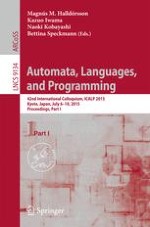2015 | OriginalPaper | Chapter
On Convergence and Threshold Properties of Discrete Lotka-Volterra Population Protocols
Authors : Jurek Czyzowicz, Leszek Ga̧sieniec, Adrian Kosowski, Evangelos Kranakis, Paul G. Spirakis, Przemysław Uznański
Published in: Automata, Languages, and Programming
Publisher: Springer Berlin Heidelberg
Activate our intelligent search to find suitable subject content or patents.
Select sections of text to find matching patents with Artificial Intelligence. powered by
Select sections of text to find additional relevant content using AI-assisted search. powered by
In this work we focus on a natural class of population protocols whose dynamics are modeled by the discrete version of Lotka-Volterra equations with no linear term. In such protocols, when an agent
$$a$$
a
of type (species)
$$i$$
i
interacts with an agent
$$b$$
b
of type (species)
$$j$$
j
with
$$a$$
a
as the initiator, then
$$b$$
b
’s type becomes
$$i$$
i
with probability
$$P_{ij}$$
P
i
j
. In such an interaction, we think of
$$a$$
a
as the predator,
$$b$$
b
as the prey, and the type of the prey is either converted to that of the predator or stays as is. Such protocols capture the dynamics of some opinion spreading models and generalize the well-known Rock-Paper-Scissors discrete dynamics. We consider the pairwise interactions among agents that are scheduled uniformly at random.
We start by considering the convergence time and show that any Lotka-Volterra-type protocol on an
$$n$$
n
-agent population converges to some absorbing state in time polynomial in
$$n$$
n
, w.h.p., when any pair of agents is allowed to interact. By contrast, when the interaction graph is a star, there exist protocols of the considered type, such as Rock-Paper-Scissors, which require exponential time to converge. We then study threshold effects exhibited by Lotka-Volterra-type protocols with 3 and more species under interactions between any pair of agents. We present a simple 4-type protocol in which the probability difference of reaching the two possible absorbing states is strongly amplified by the ratio of the initial populations of the two other types, which are transient, but “control” convergence. We then prove that the Rock-Paper-Scissors protocol reaches each of its three possible absorbing states with almost equal probability, starting from any configuration satisfying some sub-linear lower bound on the initial size of each species. That is, Rock-Paper-Scissors is a realization of a “coin-flip consensus” in a distributed system. Some of our techniques may be of independent value.
